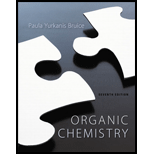
(a)
Interpretation:
The ground state electronic configuration
Concept Introduction:
- Excited state electronic configuration:
The electronic configuration that result an electron in the ground state has been moved to a higher –energy orbital.
- Ground state electronic configuration:
A description of which orbitals the electrons of an atom occupy when they are all in their lowest available energy orbitals.
(b)
Interpretation:
The ground state electronic configuration for
Concept Introduction:
- Excited state electronic configuration:
The electronic configuration that result an electron in the ground state has been moved to a higher –energy orbital.
- Ground state electronic configuration:
A description of which orbitals the electrons of an atom occupy when they are all in their lowest available energy orbitals.
(c)
Interpretation:
The ground state electronic configuration for
Concept Introduction:
- Excited state electronic configuration:
The electronic configuration that result an electron in the ground state has been moved to a higher –energy orbital.
- Ground state electronic configuration:
A description of which orbitals the electrons of an atom occupy when they are all in their lowest available energy orbitals.
(d)
Interpretation:
The ground state electronic configuration for
Concept Introduction:
- Excited state electronic configuration:
The electronic configuration that result an electron in the ground state has been moved to a higher –energy orbital.
- Ground state electronic configuration:
A description of which orbitals the electrons of an atom occupy when they are all in their lowest available energy orbitals.
Want to see the full answer?
Check out a sample textbook solution
Chapter 1 Solutions
Organic Chemistry
- Can you explain why the Br is at the 4th priority given that it has high atomic number.arrow_forwardOnly h, i And Jarrow_forwardDraw a diagram like the one shown in Figure to predict a. the relative intensities of the peaks in a triplet. b. the relative intensities of the peaks in a quintet.arrow_forward
- Determine which of the following does not follow Hund's Rule ↑↓ ↑ ↑ ↑ ↑↓ ↑↑ ↑ ↑↓ ↑ a. 1st row only b. 1st and 3rd row c. 1st, 2nd and 3rd row d. nonearrow_forwarda.-1024 kJ mol-1 b.189 kJ mol-1 c.-1238 kJ mol-1 d.-648 kJ mol-1arrow_forwardLabel each hydrogen atom in the following compuonds as primary (1°), secondary (2°), or tertiary (3°)arrow_forward
- What's the answer for 6 and 12arrow_forwardWrite down electron configuration for the ground (states) of each of the following: (a)Na (At No.=11) (b) Ca (At No.=20) (c) Sc (At No.=11) (d) Mg2+ (At No.=12) (e) Cl- (At No.=17)arrow_forwardWe have talked about different light wave lengths/light spectrums. Why do most plants appear green? What two wave lengths/Light spectrums are most absorbed by plants? A, B.arrow_forward
- Electronic configuration of Magnesium is Select one: 1s2 2s2 2p6 3s1 3p2 1s2 2s2 2p6 3s2 3p2 1s2 2s2 2p6 3s2 1s2 2s2 2p6 3s2 3p6 4s2 3d5 Clear my choicearrow_forward1. This atoms has autumic number 25. a) How many atoms in first orbit? b) How many atoms in last orbit? c) Is this atom reactive (answer yes for reactive and no for not active).arrow_forwardIdentify the configuration of E and Farrow_forward
 Organic Chemistry: A Guided InquiryChemistryISBN:9780618974122Author:Andrei StraumanisPublisher:Cengage Learning
Organic Chemistry: A Guided InquiryChemistryISBN:9780618974122Author:Andrei StraumanisPublisher:Cengage Learning Chemistry by OpenStax (2015-05-04)ChemistryISBN:9781938168390Author:Klaus Theopold, Richard H Langley, Paul Flowers, William R. Robinson, Mark BlaserPublisher:OpenStax
Chemistry by OpenStax (2015-05-04)ChemistryISBN:9781938168390Author:Klaus Theopold, Richard H Langley, Paul Flowers, William R. Robinson, Mark BlaserPublisher:OpenStax Physical ChemistryChemistryISBN:9781133958437Author:Ball, David W. (david Warren), BAER, TomasPublisher:Wadsworth Cengage Learning,
Physical ChemistryChemistryISBN:9781133958437Author:Ball, David W. (david Warren), BAER, TomasPublisher:Wadsworth Cengage Learning,


